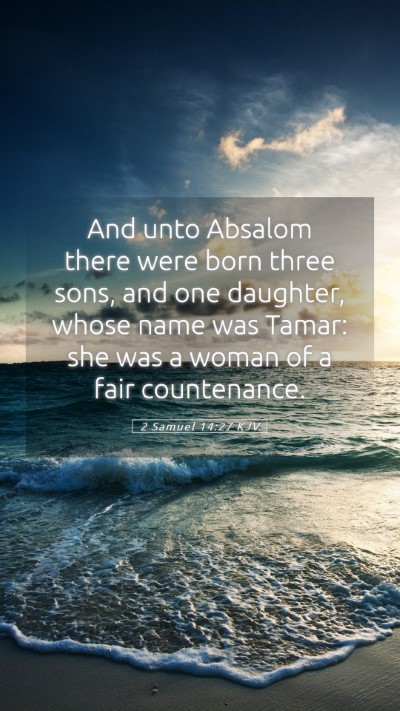Understanding 2 Samuel 14:27: A Biblical Exegesis
Verse: 2 Samuel 14:27: "And unto Absalom there were born three sons, and one daughter, whose name was Tamar: she was a woman of a fair countenance."
Overview of the Verse
This verse from 2 Samuel introduces us to the family of Absalom, King David's son, and highlights the significant details surrounding his children. The mention of Absalom having three sons and one daughter named Tamar serves as a pivotal point in understanding his lineage and personal life in the context of the scriptural narrative.
Bible Verse Meaning
The verse illustrates the familial structure of Absalom and provides insights into his character. Commentators like Matthew Henry emphasize that the birth of these children, along with the mention of Tamar, not only serves to humanize Absalom but also foreshadows the tragic events that unfold later in the narrative, particularly the themes of rebellion and revenge.
Furthermore, Adam Clarke offers a detailed interpretation that highlights the implications of the names and characteristics of Absalom's children. The mention of their mother and the beauty of Tamar suggests the importance of lineage and inheritance in the cultural context of Israel. The beauty of Tamar can also be seen as entangled with the fate of her family, making it a point of interest for readers and scholars alike.
Commentary Insights
-
Matthew Henry: Henry notes that Absalom’s family is treated with dignity, and he draws attention to the impact of beauty and character in the biblical narrative. He suggests that the verse’s focus on Absalom's children reflects on the larger story of familial relationships and the consequences of choices made by the parents.
-
Albert Barnes: Barnes highlights the significance of the names and the legacy left behind by Absalom. The emphasis on Tamar symbolizes not just external beauty but the complex emotional and relational dynamics that weave through the text of 2 Samuel. He also draws comparisons to how lineage often carries the weight of past actions.
-
Adam Clarke: According to Clarke, the verse hints at the idea that despite his external beauty and the nobility of status, Absalom's downfall was imminent due to his actions later in life. Clarke’s analysis often points to the way the author of 2 Samuel constructs narratives to signal moral lessons about the implications of pride and ambition.
Bible Study Insights
For those engaged in Bible study, understanding this verse contributes to a larger conversation about family dynamics, choices, consequences, and character development in the Old Testament. It serves as a reflection on how the actions of one individual can have lasting effects on their family and future generations.
The significance of this verse invites discussion in Bible study groups about how beauty and reputation can influence one's identity and choices. It also lays a foundation for exploring themes of rebellion, forgiveness, and the repercussions of anger and vengeance.
Cross References
Relevant cross references for 2 Samuel 14:27 include:
- 2 Samuel 15:1-6 - The beginning of Absalom's rebellion.
- 2 Samuel 13:1-22 - The story of Tamar and the consequences of Amnon's actions.
- 2 Samuel 18:14-15 - The tragic end of Absalom's life.
Conclusion
In summary, 2 Samuel 14:27 serves as a poignant reminder of the interplay between familial bonds and personal choices. The insights gathered from reputable commentaries shed light on the essential themes of loyalty, beauty, and the unfolding consequences of actions within the sacred texts. Understanding such verses contributes significantly to deeper biblical understanding and provides valuable lessons for applying scripture to daily life.


